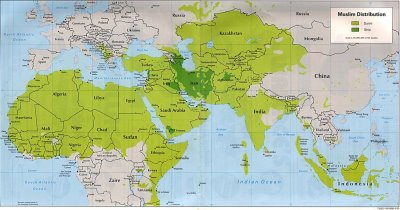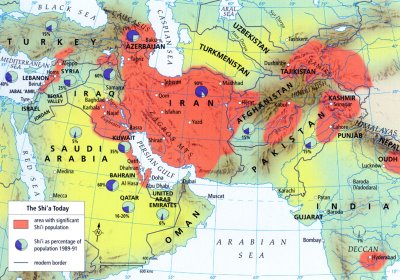Once in a While a Good Deed Does Go Unpunished – The Real Person of the Year, Senator Lieberman
Senator Lieberman showed the country his courage and his wisdom last year. He showed the cowards, the political opportunists and the know-nothings in the Democratic Party that there are a few people of principle who understand what was at stake in Iraq in 2003 and is even more at stake today. Those who ridicule President Bush for not understanding the historic conflicts between Shi'a and Sunnis don’t get it that these groups live together in relative harmony in many Muslim countries (see below), and that the extreme violence we see in Iraq is because we were succeeding there, but did not foresee the consequences of our early success; and countries like Iran and Syria and groups like Al Qaeda have thrown everything they have into that country to stop democracy from succeeding and to end our influence in the area. When the British lost 3000 men on one troopship evacuating Dunkirk, they didn’t stop trying; neither did the Allies quit when similar losses were incurred on one day called D-Day.
Why We Need More Troops in Iraq
By Joseph Lieberman
Friday, December 29, 2006
The Washington Post
I've just spent 10 days traveling in the Middle East and speaking to leaders there, all of which has made one thing clearer to me than ever: While we are naturally focused on Iraq, a larger war is emerging. On one side are extremists and terrorists led and sponsored by Iran, on the other moderates and democrats supported by the United States. Iraq is the most deadly battlefield on which that conflict is being fought. How we end the struggle there will affect not only the region but the worldwide war against the extremists who attacked us on Sept. 11, 2001.
Because of the bravery of many Iraqi and coalition military personnel and the recent coming together of moderate political forces in Baghdad, the war is winnable. We and our Iraqi allies must do what is necessary to win it.
The American people are justifiably frustrated by the lack of progress, and the price paid by our heroic troops and their families has been heavy. But what is needed now, especially in Washington and Baghdad, is not despair but decisive action -- and soon.
The most pressing problem we face in Iraq is not an absence of Iraqi political will or American diplomatic initiative, both of which are increasing and improving; it is a lack of basic security. As long as insurgents and death squads terrorize Baghdad, Iraq's nascent democratic institutions cannot be expected to function, much less win the trust of the people. The fear created by gang murders and mass abductions ensures that power will continue to flow to the very thugs and extremists who have the least interest in peace and reconciliation.
This bloodshed, moreover, is not the inevitable product of ancient hatreds. It is the predictable consequence of a failure to ensure basic security and, equally important, of a conscious strategy by al-Qaeda and Iran, which have systematically aimed to undermine Iraq's fragile political center. By ruthlessly attacking the Shiites in particular over the past three years, al-Qaeda has sought to provoke precisely the dynamic of reciprocal violence that threatens to consume the country.
On this point, let there be no doubt: If Iraq descends into full-scale civil war, it will be a tremendous battlefield victory for al-Qaeda and Iran. Iraq is the central front in the global and regional war against Islamic extremism.
To turn around the crisis we need to send more American troops while we also train more Iraqi troops and strengthen the moderate political forces in the national government. After speaking with our military commanders and soldiers there, I strongly believe that additional U.S. troops must be deployed to Baghdad and Anbar province -- an increase that will at last allow us to establish security throughout the Iraqi capital, hold critical central neighborhoods in the city, clamp down on the insurgency and defeat al-Qaeda in that province.
In Baghdad and Ramadi, I found that it was the American colonels, even more than the generals, who were asking for more troops. In both places these soldiers showed a strong commitment to the cause of stopping the extremists. One colonel followed me out of the meeting with our military leaders in Ramadi and said with great emotion, "Sir, I regret that I did not have the chance to speak in the meeting, but I want you to know on behalf of the soldiers in my unit and myself that we believe in why we are fighting here and we want to finish this fight. We know we can win it."
In nearly four years of war, there have never been sufficient troops dispatched to accomplish our vital mission. The troop surge should be militarily meaningful in size, with a clearly defined mission.
More U.S. forces might not be a guarantee of success in this fight, but they are certainly its prerequisite. Just as the continuing carnage in Baghdad empowers extremists on all sides, establishing security there will open possibilities for compromise and cooperation on the Iraqi political front -- possibilities that simply do not exist today because of the fear gripping all sides.
I saw firsthand evidence in Iraq of the development of a multiethnic, moderate coalition against the extremists of al-Qaeda and against the Mahdi Army, which is sponsored and armed by Iran and has inflamed the sectarian violence. We cannot abandon these brave Iraqi patriots who have stood up and fought the extremists and terrorists.
The addition of more troops must be linked to a comprehensive new military, political and economic strategy that provides security for the population so that training of Iraqi troops and the development of a democratic government can move forward.
In particular we must provide the vital breathing space for moderate Shiites and Sunnis to turn back the radicals in their communities. There are Iraqi political leaders who understand their responsibility to do this. In Anbar province we have made encouraging progress in winning over local Sunni tribal leaders in the fight against al-Qaeda and other terrorists. With more troops to support them, our forces in Anbar and their Sunni allies can achieve a major victory over al-Qaeda.
As the hostile regimes in Iran and Syria appreciate -- at times, it seems, more keenly than we do -- failure in Iraq would be a strategic and moral catastrophe for the United States and its allies. Radical Islamist terrorist groups, both Sunni and Shiite, would reap victories simultaneously symbolic and tangible, as Iraq became a safe haven in which to train and strengthen their foot soldiers and Iran's terrorist agents. Hezbollah and Hamas would be greatly strengthened against their moderate opponents. One moderate Palestinian leader told me that a premature U.S. exit from Iraq would be a victory for Iran and the groups it is supporting in the region.
Meanwhile, the tens of thousands of Iraqis who have bravely stood with us in the hope of a democratic future would face the killing fields.
In Iraq today we have a responsibility to do what is strategically and morally right for our nation over the long term -- not what appears easier in the short term. The daily scenes of death and destruction are heartbreaking and infuriating. But there is no better strategic and moral alternative for America than standing with the moderate Iraqis until the country is stable and they can take over their security.
Rather than engaging in hand-wringing, carping or calls for withdrawal, we must summon the vision, will and courage to take the difficult and decisive steps needed for success and, yes, victory in Iraq. That will greatly advance the cause of moderation and freedom throughout the Middle East and protect our security at home.
The writer is an Independent Democratic senator from Connecticut.
Added by Russ Wilcox:
According to most sources, including the US Library of Congress, present estimates indicate that approximately 85-90% of the world's Muslims are Sunni and approximately 10-15% are Shi'a. Today there are roughly 216 million Shi'as (including Twelvers, Ismailis, Zaydis and Alawis) all over the world, and around three quarters of those reside in Iran, Pakistan, Iraq, Afghanistan and India.
A large portion of the world's Shi'a live in the Middle East. They constitute a majority in Iran, Iraq, Bahrain,Oman and Azerbaijan. They remain as significant minorities in Afghanistan, Syria, Pakistan, Turkey and Yemen. In Lebanon Shi'as form a plurality (the largest of groups, with none forming a majority). Among smaller Persian Gulf states, Qatar, Kuwait and the United Arab Emirates have significant Shi'a minorities, as do the Eastern Province of Saudi Arabia.

Labels: War on Islamic Terrorism



1 Comments:
what we gotta do is stop putting handcuffs on and prosecuting our fighting men because of the bleeding hearts , just turn them loose and let them do their job , and if the press doesn,t like . screw em . Jody
Post a Comment
<< Home